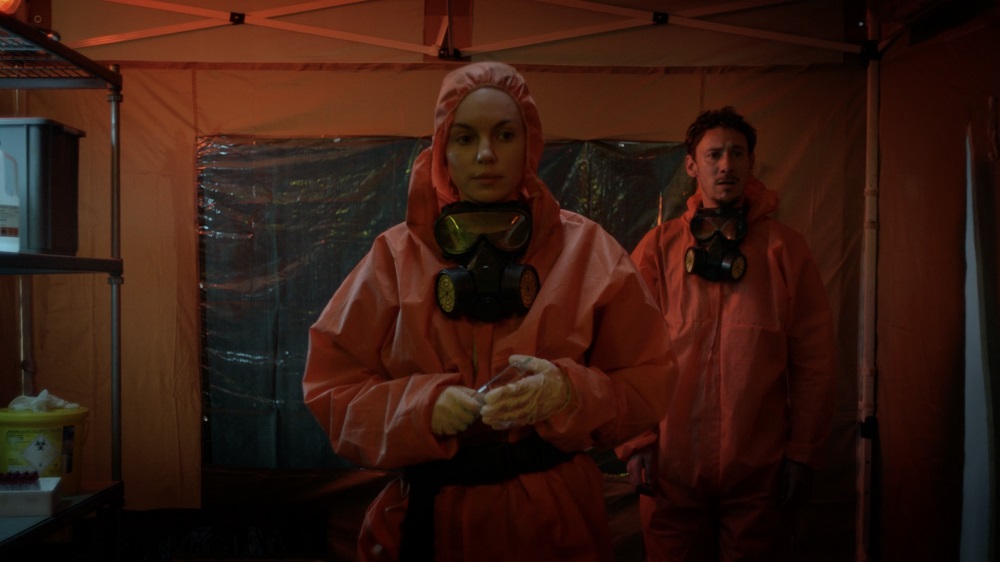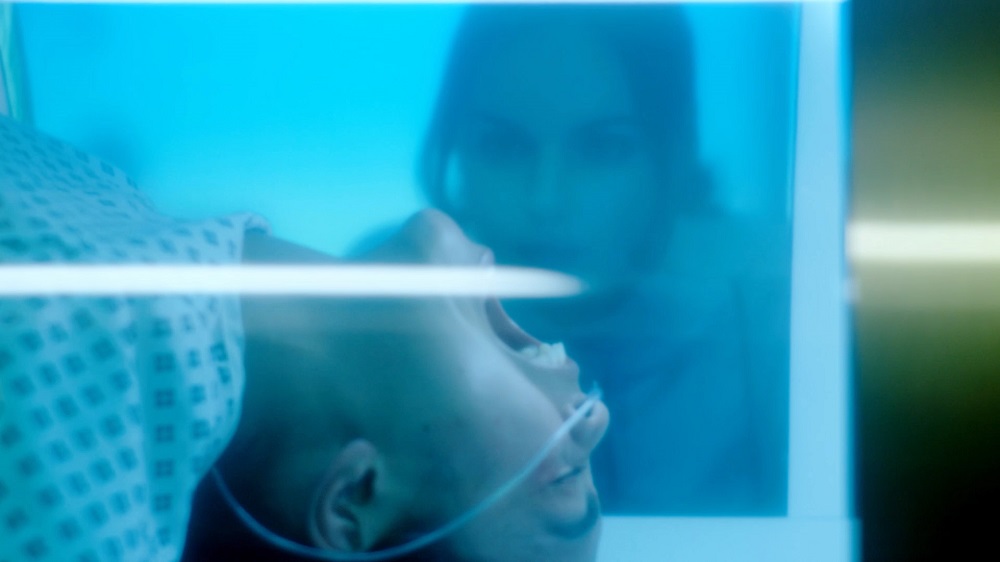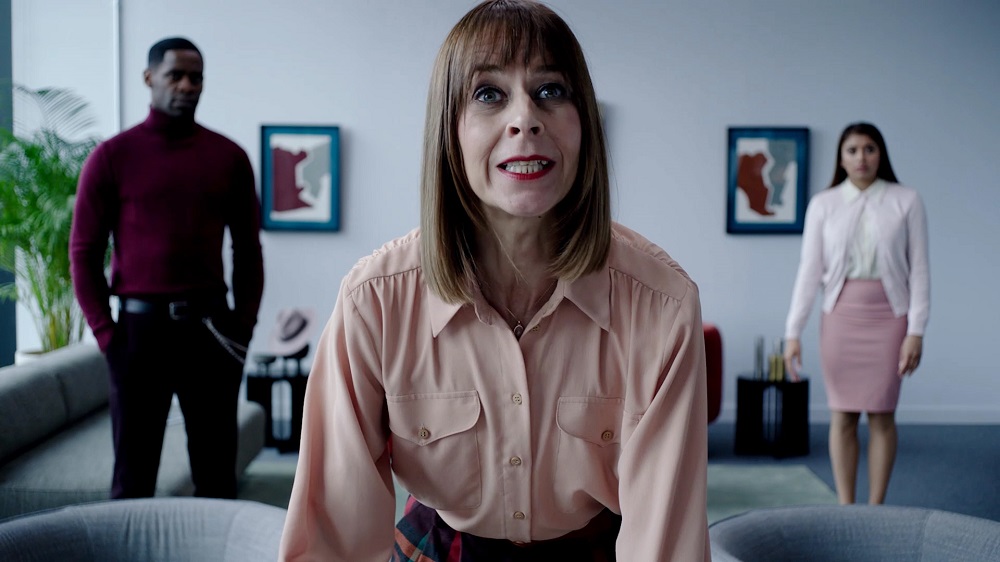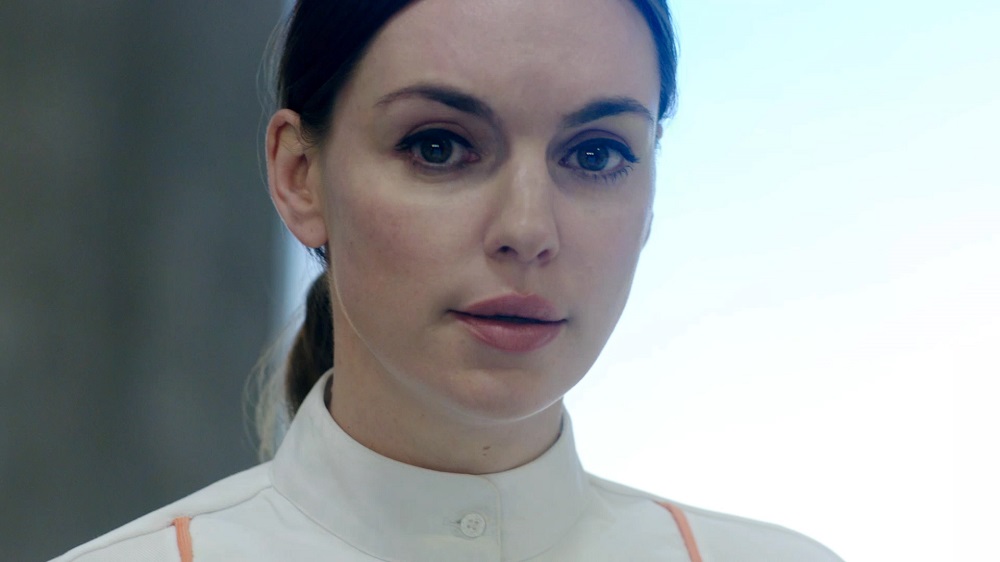This is the first time I’ve done an interview staring at a wall; Paul Raschid is pretty close by in West London but, given the current climate, comes to me from speakerphone perilously recorded by some as-yet untested third-party app.
Raschid has just directed The Complex – an interactive, Bandersnatch-esque thriller that’s about to drop on PC, PS4, Xbox and Switch. The film, written by Lynn Renee Maxcy from The Handmaid’s Tale, seems eerily prescient in the middle of a pandemic – a story about bioterrorism and a highly infectious virus that quickly spurs panic and confusion. After a brief discussion about the previous evening’s applause for the NHS, we turn to the film.

Since Bandersnatch, I’ve not seen anything like this – but in the 90’s I hear it was a bit of a thing!
Paul Raschid: Yeah it’s an interesting one, because in all the interviews I’m doing everyone’s saying FMV (full motion video) games are making a comeback from the 1990’s – and if you check back there are some really funny wacky ones out there.
How did you get involved in this sort of interactive project?
PR: John Giwa-Amu, who is one of the producers alongside Jade Alexander, is a producer whose work I’ve always admired on the British independent genre film circuit. The Machine and Don’t knock Twice were two that I saw and John was on my radar: I saw him in Cannes and at Raindance, where I actually saw Don’t Knock Twice and saw him do a presentation of it. Whenever I saw him speak and I saw him work, I felt that he made the same sort of films as I wanted to make and one day I really wanted to have a conversation with him. And, as luck would have it, at the beginning of 2019, he saw White Chamber – which was the last film that I did – and thankfully he liked it and got in touch and said “I’ve got something that I think you might be suited for, and I’d like you to pitch for it to me and Jade”. Luckily they liked my pitch and I’m eternally grateful for them giving me this opportunity and letting me come on board for the project at the start of last year.
How did you find the process of filming a piece of work like this, in comparison to, say, White Chamber.
PR: Yeah, well… *laughs* where do you start? I think with interactive, the first thing you gotta wrap your head around is the format of the script and the way you need to shoot things. Sometimes you’ve got to break things up, because basically you’re shooting loads of mini-scenes which are then going to get stitched together, and then they’re going to put it into a game engine – which is what Wales Interactive are doing. So it becomes a lot more segmented, and obviously you need to shoot a lot more content. I think there’s about 150 minutes’ worth that we ended up shooting, which is actually double what we shot for White Chamber. So first of all, you’ve got to get your head around the fact that you’re shooting a hell of a lot more than a traditional linear film, and that it’s going to be a lot more fragmented in terms of the way you shoot things. There are loads of little scenes – about 280 scenes – that we had to shoot, even though they seamlessly appear to flow into one another when you play through. And then that breeds all sorts of other issues like continuity, and the actors have to get their heads around how their emotions have got to change in different ways throughout. As far as logistics go, though, it’s not so different to shooting a film on a conventional set, it’s just trying to grasp the theoretical elements of it being interactive.

And did you find yourself dealing with pacing differently? Because you’ve got these scenes where you’ve got to make a decision, and the actual action onscreen has to be somewhat unnaturally prolonged in order to allow for that. Is your mind just screaming ‘CUT!’?
PR: Yeah, for many decision pointers we wanted the scene to keep moving if possible. If it wasn’t Amy, then something else could be happening in the scene. At the beginning, when she’s speaking to Talo and he says “are you going to hurt me?”, Amy is contemplating her response but at the same time we wanted to keep the scene moving so Talo keeps moving and you have Rees in the corner assessing the situation and we never wanted it to feel unnatural. We wanted the action to keep moving even though we needed those five to ten seconds of decision time. So we tried to make those moments of contemplation as organic as possible and hopefully that came across.
I know Wales Interactive had previously screened one of their films, Late Shift, in cinemas. And obviously in the current climate that’s an unrealistic proposition, but had you planned to do something like that? And would you want to when this inevitably blows over?
PR: It’s a real shame, because we were planning on screening at the Brussels International Fantastic Film Festival in April, where Late Shift also screened and White Chamber screened in 2018. The festival is really close to my heart. We got selected officially for it and that would have been in an auditorium. There’s an app you can use where the audience goes in with their phones and whenever there’s a decision point, it comes up on their phones and they can vote and it gets aggregated. So there is the capacity and the tech to do it out there. Whether this would have worked as a mainstream release, I don’t know – I don’t think cinemas are quite there yet with implementing this technology on a widespread basis. But I think it would have been nice to do a film festival run, even if those hopes have sadly been dashed! But it is what it is, you know, there are far bigger things going on in the world right now other than film festivals, and you just gotta hope that when it comes out, people enjoy it from the comfort of their own homes.

And where do you personally draw the line between ‘film’ and ‘game’? I found it interesting that when I started The Complex up, the menu states ‘new game’ but the first thing we see onscreen is ‘A Paul Raschid film’.
PR: That’s a really interesting one. For me, I think it’s both. I keep saying ‘film’ automatically as a filmmaker, but I think for projects in this space there is definitely a spectrum. I think we are very much slap bang in the middle – it’s not an experience where the picture ever stops moving or where you need to point and click. Pacing-wise, we wanted people to be able to sit and watch the whole thing in an uninterrupted 70-90-minute block depending on the decisions they made, and that’s like a feature-length piece. There’s no other game-like functionality that stops the feature, if that makes sense. It’s filmic enough, but it has these game dynamics, and that’s why it fits precisely in the middle – just like Bandersnatch. There’s another FMV piece called Erica which recently released, and that has a little more game-like functionality in it. The story stops and you are able to interact with objects around the room, and you can also move the character around the room. And for me, that shifts the overall thing closer to the ‘game’ side of the spectrum. That’s where I see the line. It’s an exciting time and people are free to explore other parts of that spectrum too – but for me, this area suits me best as a filmmaker just coming into the gaming world. J
And do you see interactivity as something that will creep more and more into filmmaking, or as a perpetual sort of niche?
PR: I really believe in the format, and I’d like it to catch on. There’s such a big audience now and people are consuming content more than they’ve ever done, whether that be TV, film, or games. So I think there’s always space for new things. There’s space for traditional works and hybrids. Nobody is saying that this is going to replace traditional films, but it’s a new format that people can enjoy. I think film is an interesting one, because genre film viewers like to shout out things like “I wouldn’t do that!”, because they want to talk about the characters and speculate. And most audience members are scrutinising the choices that protagonists and antagonists are having in a film. So I think just giving audiences that agency to have control over things they have always wanted to control… and if you look at games, there’s such an emphasis now on cutscenes and motion capturing actors and making these cinematic landscapes and epic feelings. So I think both films and games have been trying to borrow elements from the other side and it’s only natural that they’re beginning to coalesce a bit more. It’s an exciting time and I think there’s space for all sorts of interesting collaborations.

In The Complex you have these three elements: you have the personality score of the main character, these relationship statuses with other characters, and also nine different endings. Do you think the film works better as something which is played multiple times or as a single sort of monolithic experience?
PR: I definitely think it should be replayed because there’s a lot to be discovered in there, especially with the relationship statuses – what that enabled us to do, and Michelle [Mylett] who did so well playing the lead, is to allow the audience to craft their own protagonist. You could make her someone who was more altruistic and kind, or almost an antihero in some ways. That’s one of the main arguments for replayability – the malleability you have with Amy as the protagonist. There are a lot of different plot points and locations you can access. But obviously that first playthrough is the yardstick people will use to assess the film on subsequent replays. So it’s definitely an important experience, because it sets the bar and gives the audience their first impression of the piece; but I think there’s a lot to discover, especially in Michelle’s performance, that warrants replayability. J
And as a final question: What would you like the audience to take out of the experience?
PR: Rees has a speech towards the end where he talks about the importance of decisions in people’s lives and the consequences of them, and that’s what makes a life. So I hope that, having these decisions which alter the way people perceive you and the relationships you have with others, it will sort of make people consider the consequences of decisions they make. And that could be more far-reaching than they perhaps realise with regards to the people around them. Now, more than ever, the consequences of our actions are things which we need to focus on and think deeply about, so it’s quite pertinent and topical on that sense. On a deeper and more profound level, I hope it gets people thinking about decisions and the consequences of them and thinking about their relationships with people as well. That’s what I hope people would feel and think about.
The Complex is available worldwide on PC, PS4, Xbox One & Nintendo Switch on 31st March.
